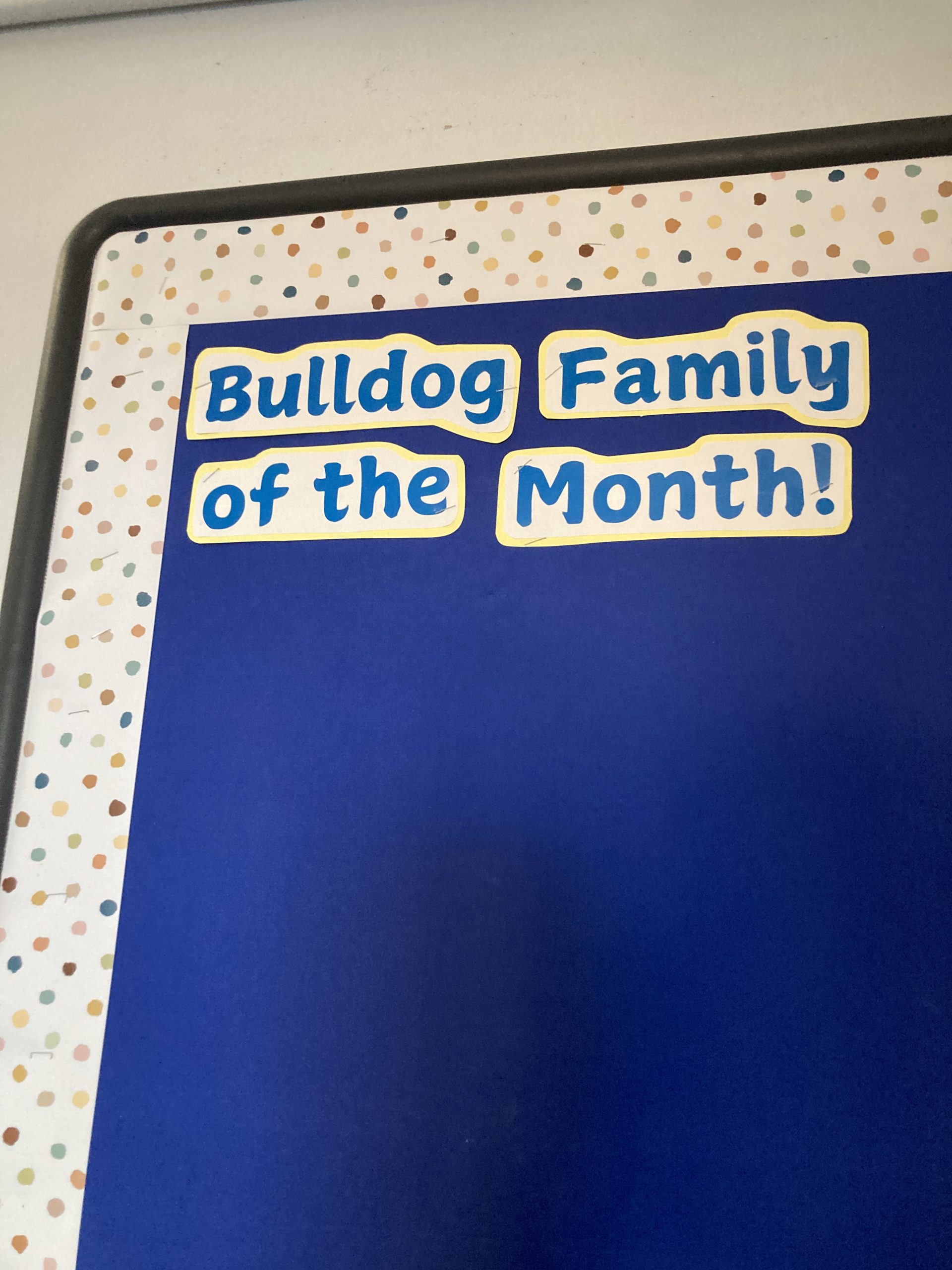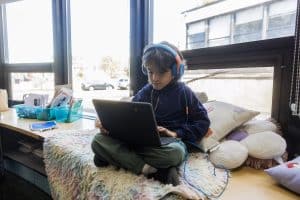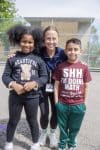CICS West Belden: For the Community
CompetencyWorks Blog
This is the second post in a series of three posts about CICS West Belden. In post 1, we introduced the school. In post 3, we focus on their personalized and student-centered learning approach. Check out the whole series!

Jesus Meraz, the community school coordinator at the Chicago International Charter School (CICS) West Belden, managed by Distinctive Schools, smiles fondly as he talks about some of the students he has worked with over the past year.
“It changes the way they start behaving. They feel thankful and appreciative, and they’ll show off whatever things you got [them]. They always come and thank me in person and show me their new jacket, their new shoes. I think it just gives them a little bit of happiness to know that there’s somebody else besides their family supporting them. And it takes worries from them, right? They don’t have to worry about not having a winter jacket, not having the right shoes, so their only focus will be school.”
This principle is at the heart of community schools: places where “educators, local community members, families, and students work together to strengthen conditions for student learning and healthy development” (p. 1). As the Coalition for Community Schools explains, “It is in this environment that schools are able to generate optimal, ‘whole child’ conditions for student learning and development” (p. 3).
As we described in our opening post for this series, there are six key practices that define community schools. These are:
- Powerful student and family engagement
- Collaborative leadership and shared power and voice
- Expanded and enriched learning opportunities
- Rigorous, community-connected classroom instruction
- Culture of belonging, safety, and care
- Integrated systems of support
In this post, we’ll explore the ways in which CICS West Belden enacts these six key practices. We’ll describe the incredible work that they do to support and nurture their students, while also noting challenges they’ve faced and areas where they still want to grow.
Student and Family Engagement
“Families and students actively participate in the school community and are key partners in decision-making, shaping the school’s environment, priorities, and partnerships. Families’ lived experiences and wisdom inform approaches to student success.” (Community Schools Coalition)
At CICS West Belden, staff know not only their students, but their families as well. School leaders acknowledge the importance of students’ support systems outside of school. They work hard to show mutual respect and build collaboration between the school and the rest of the students’ community. As Kathy McInerney, the Assistant Principal, explains, “It really feels like the parents treat the teachers as experts and lean in for advice around their students’ work, and vice versa. We’re the experts in education; they’re the experts in their kids. So just as much as they lean on us for advice, we lean on them. It’s a really great connection.”
The school provides many opportunities for families to come into the building and participate in school activities. One special example is their twice-annual community festivals: every fall and spring, the school hosts a big event for the neighborhood. They invite local vendors to set up booths around the school to sell their goods; teachers and students organize games and activities; local restaurants sell traditional foods from different countries; and the whole environment feels like a celebration. As one fifth grade student explained, “People come together to celebrate their culture, their history. So it’s a really fun thing to do.”

Beyond these special events, the school takes care to make the surrounding community feel welcomed and celebrated. A bulletin board near the main office celebrates the “family of the month,” and the school tries to support local family-owned businesses whenever they can. The hallways are decorated with flags from around the world, which cheerfully and quietly communicates a message of welcome to this diverse community. Many staff speak Spanish, or are working on learning it – students joke about teaching their teachers Puerto Rican slang. The school is also starting to offer free English as a Second Language classes on their campus for the local community outside of school hours, hoping to become a hub for the whole neighborhood, even if they don’t have children at the school. The community schools coordinator is constantly building partnerships around the neighborhood and the city, bringing in external resources to address needs that are identified by parents, teachers, and students.
This level of engagement has taken time to build and is still a work in progress, of course. Staff and parents both acknowledge that building awareness and trust of the school’s approach and what the school has to offer has taken some time. Jesus reflected, “When I first started here, the community didn’t know who I was and didn’t know what I was supposed to do. So when I would host these Parent-Teacher League meetings, nobody would show up. I was a new guy.” But with consistency – being outside to greet them in the morning, sending out emails and calling families about opportunities, stopping to talk and say hi – he has started to see a shift. “Now that it’s my second year, I get the same 10 people every meeting. But my goal is to see more family engagement, more families involved helping the West Belden community. I want to make sure they know that I’m here and what the purpose is.” Families are busy, and it’s a challenge to keep them involved and committed – but one that West Belden is tackling head-on.
Collaborative Leadership and Shared Power
“Families, students, teachers, principals, and community partners co-create a culture of professional learning, collective trust, and shared responsibility as they make decisions together.” (Community Schools Coalition)
To encourage families to become and stay engaged, the school has needed to build structures and opportunities for them to share their opinions and help make decisions that support their kids. These structures help build trust that the school really means it when they say that they want to collaborate with families and community partners. At CICS West Belden, some of those structures are familiar: the Parent-Teacher League, the principal’s Bilingual Advisory Committee, and regular surveys. Some are less formal but no less important, like staff intentionality about talking to families during pick-up and drop-off every single day.
Students from West Belden also get a voice, both in their own learning and the school’s overall function. Students, together with a family member, have individual meetings with school staff at the start of each year to learn about that student’s goals, interests, and needs. Students take a survey to share their input on questions facing West Belden. And students from the school even get a say in how the Distinctive Schools network functions through the network’s Learner Advisory Group. Every quarter, students who are part of the Advisory Group travel to the network headquarters to discuss their school experiences with network leaders, look at data together, and share ideas they have for improving the schools.

The school has also built systems for teachers to help drive decision-making. Principal Eng organizes town halls for teachers regularly – accompanied by coffee and donuts – to ask for input and feedback. Jesus has built a simple online form that teachers can fill out when they identify a need among their students. Part of his work involves reviewing those responses, identifying themes, and then finding resources to meet those needs. For example, recently many teachers had been reporting that students needed more support in math, and parents were asking for tutoring support as well. Jesus used this input to develop an after-school math club in collaboration with a local community partner.
No matter their vantage point, members of the West Belden community are invited to share their opinions, and have many avenues to be heard. As Principal Eng explained, “There is always going to be a voice at the table for families, for teachers, and for students.”
Expanded Learning Opportunities
“Before- and after-school, weekend, and summer programs provide expanded time, expanded staffing, and expanded opportunities for learning and engagement. Students have opportunities to explore their passions, dive deeper into the application of academic content, and strengthen their knowledge and skills.” (Community Schools Coalition)
CICS West Belden is working hard to provide opportunities both during and outside of the school day for students to explore their passions. One example of this is Career Day, where the school invites community members and parents to come talk about their jobs and help students learn about options available to them. Principal Eng smiles as she talks about the students who tell her they want a career in video games: “OK, gaming, but there’s also marketing, there’s also production. I want them to be able to see the opportunities… and have them explore those different pathways.” Similarly, a local sports organization had recently come to the school to present about different opportunities in sports, with an emphasis on developing life skills. As Special Education teacher Brian Finnerty explained, “It’s not just about soccer or football, but the skills necessary to be a good teammate, to be a good communicator, to show good sportsmanship. So working to build skills that they use outside of school.”
Parents also offer suggestions for new opportunities and experiences. Math teacher Angela Serrano explains, “Families reach out to me if they find cool opportunities that are happening outside of school, and they’ll let me know if there’s something we can do to have the kids really get a sense of what’s happening in the outside world. So we’re really connected to one another and we all have, like, buy-in for these kids.”
Jesus has big dreams for expanding the set of offerings that West Belden provides to include activities that the school simply doesn’t have the space or equipment for. “My big dream is to find organizations that offer affordable before- and after-school programming and that offer our students skills that they don’t learn at West Belden. I want them to learn something new that we just can’t offer here. Like computer science, some sort of engineering after-school program.” The school faces many constraints – the building is rented, and the budget is limited. But through partnerships, they are able to provide many opportunities to their students.

Community-Connected Classroom Instruction
“Teaching and learning in the school infuses high-level content and skills with real-world learning opportunities. The curriculum is deeply connected to the local community and students’ identities, cultures, and experiences, providing opportunities for students to engage in meaningful inquiry-based learning and problem-solving.” (Community Schools Coalition)
This is one of the areas CICS West Belden hopes to grow into in future years. As Principal Eng explained, the school is really focused right now on building a strong foundation of relationships and building students’ academic skills, like asking for help and identifying their own areas for growth. From there, “We’re really hoping to get that ‘learner connected’ piece, where – building out our partnerships with our community school coordinator – we can really connect more of the learning that’s outside of school and bring it inside the school too” (LEAP Learning Framework).
But despite not yet having an intentional pedagogy and structure, students are making connections between their learning at school and their lives outside of school. Students gave examples of using skills acquired in math class to help their parents calculate how much material to buy for a project at their house, or using interpersonal skills developed in an after-school program to solve a conflict with friends. This sense of relevance and applicability of learning is a promising foundation to build on as the school works to develop more community-connected and real-world learning opportunities.

Culture of Belonging and Care
“The school climate is welcoming and fosters trust among students, families, partners, and staff. Each person in the school community is valued for their rich diversity of experiences and is encouraged to share their views, knowledge, and culture.” (Community Schools Coalition)
Of the six elements of a community school, this one shines most brightly. Students gushed about the adults at school, saying things like, “They’re really kind to us, so we want to show respect to them” and “My school not only cares about educational things, they care about mental health and everything else.” Every single student we spoke to mentioned that their teachers care about them personally, notice how they’re doing, and make time to talk to them – even if that teacher is “strict” or a “hard nut to crack.” They explained how this intentionality helped them feel cared for and supported, and thus eager and able to learn. And this culture of care extended beyond just the classroom – students poured out love for a cafeteria worker named Mr. Miguel, who sits and talks with them at lunchtime and seems to always have candy or snacks to swap.
Math teacher Angela Serrano agreed. “A lot of the students live really close, and there are things happening in their community every day. Even if they want to leave it outside of our doors, it still comes in anyway. So making time and space for that in my classroom – like, giving them the opportunity to share something with me and giving them that space, even for five minutes… is really important in my practice, so that they feel comfortable and they feel like we have a good relationship.”
The impact of this relational approach isn’t just touchy feely; it has also had a demonstrated impact on attendance. Although typically middle school grades have the lowest attendance rates, at West Belden it’s the opposite, with the middle school attendance rate averaging 96%, and the schoolwide attendance rate hovering around 94%. As Principal Eng explains, “I see it in the eyes of the kids. You know, they have their days, but they’re always happy to be here. So when I see that – they feel like a part of a community, and you see that with their learning, where they want to do the best for their community and themselves.”
Integrated Systems of Support
“A dedicated team composed primarily of school staff and community partners intentionally and systematically coordinates services, supports, and opportunities that foster individual and collective well-being, using an assets-based approach to nurture the strengths and address the needs of students and families.” (Community Schools Coalition)

To keep these many moving pieces working together, the school has built a student support team. This group is made up of social workers, speech therapists, occupational therapists, the community schools coordinator, and the administrative team. This team works to identify needs and respond to them, and to ensure that the entire school staff is bought in and aware. As Assistant Principal McInerney explains, “I think what we’ve done that’s been successful is to share the why behind something, share what it is, and then share how teachers can partner with the community schools coordinator to do so. Just figuring out the throughline has been really helpful.”
Of course, this is a work in progress. The school is still working on how to delegate work efficiently to avoid individuals being overwhelmed, while also keeping everyone informed. But they have found that being cle
ar about everyone’s role, and keeping lines of communication open – providing lots of opportunities to gather, discuss, and share feedback, usually over food – really helps to ensure coherence.
West Belden doesn’t do this work in isolation. Jesus meets monthly with the community school coordinators from other schools in the Distinctive network to share ideas, and also attends monthly gatherings with community leaders on the Northwest side of Chicago. By discussing challenges and sharing resources, ideas, and connections, the school has embedded itself in a network of support that makes this work sustainable and exciting – there is always a partner out there eager to help.
A Community of Care

The work of a community school like CICS West Belden is comprehensive. The component parts build on each other, reinforcing the message of support and care for students as whole people. In turn, the community reaps dividends in students’ learning and growth. As math teacher Serrano explains, “Our students are here every day ready to go, and I think it’s because of our staff and they see how much their teachers care for them and want them to do well, so they’re always going to show up. So because of that, since they know that we’re showing up for them, it’s really great to see the rest of the school is doing the same thing. And it feels like a family.”
And students notice. As one eighth grader said, “What makes this school special is the community, the people. Everybody’s so welcoming here, and everybody’s so nice. The teachers are willing to help you, the deans are willing to help you. I’m really grateful for it because, you know, as a student, I get a better education and a better chance in life because of this school.”
Learn More
- Finding a Way Forward Together: Community Schools and CBE
- Welcome to West Belden
- Learners at the Center: Competency-Based Education at CICS West Belden
 Kelly Organ joined the Aurora Institute as Research Manager in August 2024. She previously served as Director of Research Partnerships at a national nonprofit focused on youth well-being and social-emotional learning. Her career spans roles in service-learning, social entrepreneurship, action civics, and youth leadership programs, with a focus on developing culturally responsive and adaptable practices that support diverse learners.
Kelly Organ joined the Aurora Institute as Research Manager in August 2024. She previously served as Director of Research Partnerships at a national nonprofit focused on youth well-being and social-emotional learning. Her career spans roles in service-learning, social entrepreneurship, action civics, and youth leadership programs, with a focus on developing culturally responsive and adaptable practices that support diverse learners.